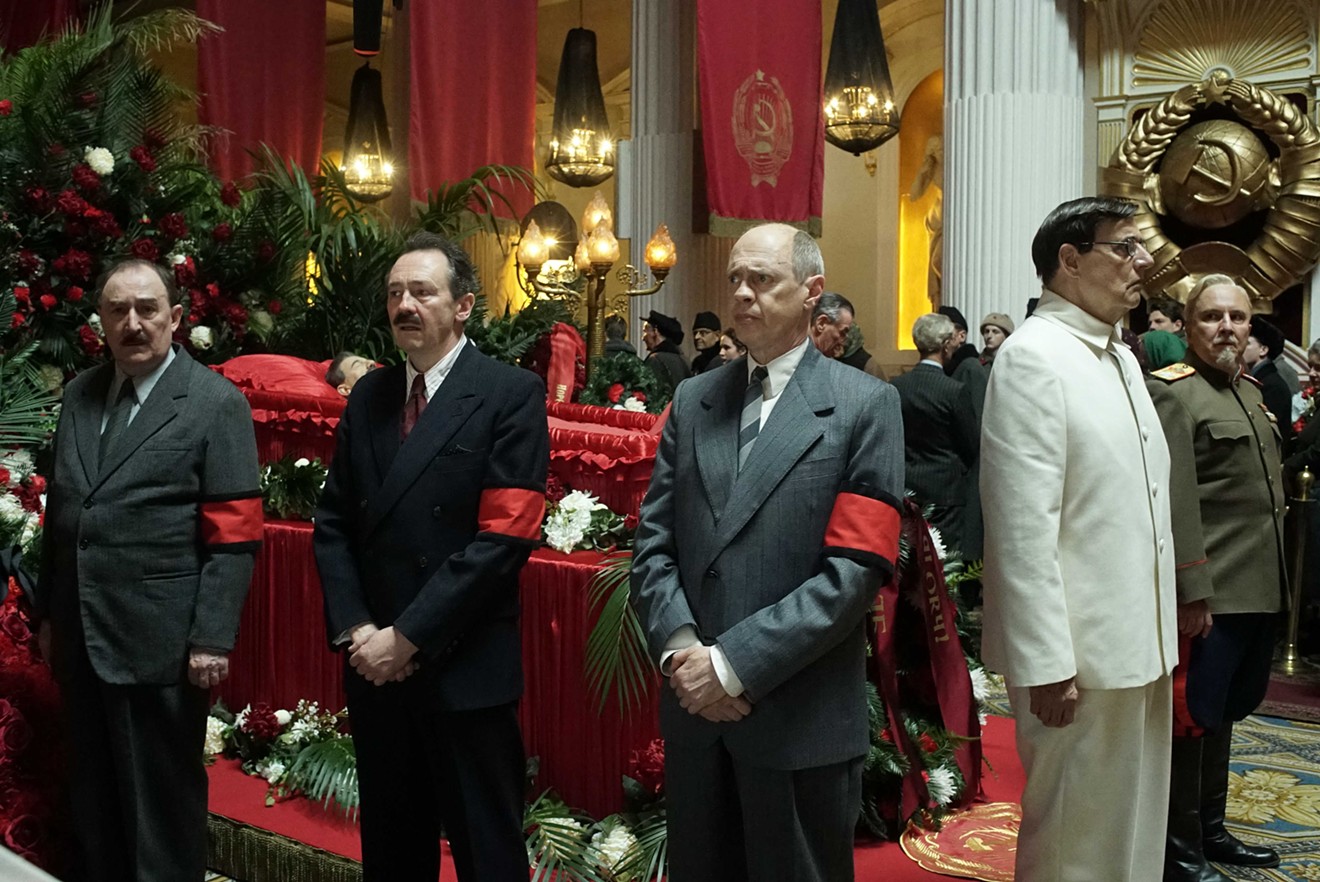“All of us taken together aren’t worth Stalin’s shit!” Nikita Khrushchev is reported to have yelled at his fellow Politburo members not long after the Soviet strongman’s death, as the committee bickered like children, hurling accusations at each other over who among them was more complicit in the era's unspeakable crimes. That insult speaks to the moral whiplash of the period: that so many Russians continued to revere Joseph Stalin even as they confronted the enormity of his evil. And it’s also the kind of line that could have easily wound up in Armando Iannucci’s foul-mouthed and funny The Death of Stalin, a comedy depicting the intricate, frenetic power struggle that heated up after the old monster’s death in 1953.
Iannucci shows that even people who were due to be executed as part of Stalin’s purges felt distraught and adrift over his passing. This is not a fanciful fiction created by a modern-day comedian. Stalin’s grip on power, his control over the life of his nation, was so complete that many of his victims did mourn his death. And as much as we may want to dismiss such phenomena as the distant convulsions of a long-gone era, recent events suggest that such attitudes are not so remote after all. The genocidal Stalin is a hero again in Russia, with approval ratings through the roof; he polls ahead of Alexander Pushkin and Vladimir Lenin and Peter the Great and even Putin the Poisoner. (Iannucci’s film has been banned in Russia; then again, so was Seth Rogen’s The Interview.) Meanwhile, a host of imitators and wannabes have sprouted up around the world — brutal, ridiculous strongmen who think nothing of imprisoning tens of thousands for vague crimes of association and turning paranoid codependency into a national ethos. Beyond that, many of Stalin's techniques — the casual rewriting of history; conformist doublespeak; the codification of constantly shifting politicized assertions as alternate, equally viable truths — have infected our discourse in the U.S., on both the left and the right.
The Death of Stalin would be a brilliant, harrowing film even without all that contemporary resonance. It's filled with the kind of rapid-fire intramural contempt that Iannucci has made his stock-in-trade: His films and shows (In the Loop, The Thick of It, Veep) revel in the loathing and vitriol expressed by political figures at others who are ostensibly on the same side. It’s fun stuff, but in a deeply corrosive way — daring to suggest that people engaged in a soul-sickening endeavor will find, well, their souls sickened. But here, he stretches his style, too, depicting the Stalinist police actions with a combination of action-movie kinetics and grisly slapstick, turning bullet-to-the-head NKVD executions into choke-on-your-laughter punchlines. It’s all part of the plan: He riles you up, makes you cackle, then sends your mind somewhere terrible.
The film is also shockingly accurate. Sure, Iannucci gives his actors leeway with accents — so that Steve Buscemi’s awkwardly scheming Khrushchev sounds curiously like a mousy Brooklyn wise-ass; Simon Russell Beale’s murderous, pedophiliac secret police chief Lavrentiy Beria sounds like a smug British politician; and Adrian McLoughlin’s Stalin has a snide, cockney accent. There are liberties taken with the story, but not as many as you might think. The Death of Stalin captures the historical reality of the Politburo’s double-crosses, all played out in an atmosphere of breathtaking, almost mystical paranoia.
If anything, Iannucci has toned some of it down: This Stalin suffers a much less protracted death than the real Stalin did, and he only comes creepily back to life once. But the image of the dying dictator briefly awakening from his coma and pointing to a kitschy painting on the wall — thus sending his assembled minions into paroxysms of misty-eyed interpretation over what he could have possibly meant — is an actual thing that happened. As is the fact that, as they hovered around Stalin’s bed, these men would interrupt their pissy arguments over his misdeeds to grovel before him whenever he briefly drifted back into consciousness.
It’s all so simultaneously horrible and hilarious that any question of whether it’s OK to laugh at this stuff — which, sadly, is the kind of question that gets asked these days — becomes moot. As Stanley Kubrick did with Dr. Strangelove, Iannucci has built a satire not by twisting the truth but by nudging reality just a few inches farther in the direction it was already going. It should not be incumbent on people of good sense to hold their laughter in the face of such absurd evil. If anything, laughter should be a requirement — because only in well-observed ridicule can we sometimes find a power strong enough to put such monsters in their places. And make no mistake about it, these are monsters, not ghosts. The Death of Stalin might be set in 1953, but you don’t have to look hard at it to see today.
[
{
"name": "Air - MediumRectangle - Inline Content - Mobile Display Size",
"component": "18855504",
"insertPoint": "2",
"requiredCountToDisplay": "2"
},{
"name": "Editor Picks",
"component": "17105533",
"insertPoint": "4",
"requiredCountToDisplay": "1"
},{
"name": "Inline Links",
"component": "18349797",
"insertPoint": "8th",
"startingPoint": 8,
"requiredCountToDisplay": "7",
"maxInsertions": 25
},{
"name": "Air - MediumRectangle - Combo - Inline Content",
"component": "17105532",
"insertPoint": "8th",
"startingPoint": 8,
"requiredCountToDisplay": "7",
"maxInsertions": 25
},{
"name": "Inline Links",
"component": "18349797",
"insertPoint": "8th",
"startingPoint": 12,
"requiredCountToDisplay": "11",
"maxInsertions": 25
},{
"name": "Air - Leaderboard Tower - Combo - Inline Content",
"component": "17105535",
"insertPoint": "8th",
"startingPoint": 12,
"requiredCountToDisplay": "11",
"maxInsertions": 25
}
]











